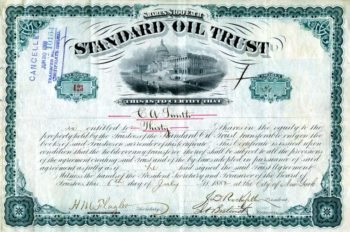
According to the Federal Reserve, of the 10 percent of families with the highest income, 92 percent owned stocks as of 2013 (latest year for their study), the same level of ownership back in 2007. But ownership slipped for people in the bottom half of the income distribution.
The top 10 percent of Americans owned an average of $969,000 in stocks. The next 40 percent owned $132,000 on average. For the bottom half of families, it was just under $54,000. With over a 200% rise in the S&P 500 since 2009, the wealth gap has clearly widened.
The chart below shows stock ownership dropping from around 65.5% in 2007 down to 52% today, despite the massive rebound in the S&P 500. The main reason for the decline? Fear and distrust. Once burned, twice shy.
Although the decline in homeownership looks steeper than the decline in stock ownership, there’s only been a 6.3% move from peak to trough in real estate unlike the 13.5% peak to trough decline for stocks. The reason has to do with transaction costs, the difficulty to sell, the need for shelter, and the view that a home is a home first and an investment second.
Although a bull market tends to financially help everyone on the spectrum, there is often more dissatisfaction due to a widening wealth gap. Those families in the 90th percentile have a net worth of almost $1,000,000. Meanwhile, those in the 50th percentile or below have hardly any net worth at all!
The Solution To Greater Financial Security
The obvious solution to greater wealth and financial security is to own stocks and real estate over the long run. You can own one or the other, or preferably both. But certainly don’t own nothing. Inflation alone will destroy your wealth over the long term.
Here are some reasons why you might want to own real estate or stocks to help you get started, or help encourage you to own more of either asset class.
Why You May Want To Own Real Estate
1) You are more in control. Every physical real estate investment you make puts you in charge as CEO. As CEO, you are able to make improvements, cut costs (refinance your mortgage), raise rents, find better tenants, and market accordingly. Of course you are still at the mercy of the economic cycle, but overall you have much more leeway in making wealth optimizing decisions. When you invest in a public or private company, you are a minority investor who puts his or her faith in management. Nobody cares more about your investment than you.
2) Leverage with other people’s money. Leverage in a rising market is a wonderful thing. Even if real estate only tracks inflation over the long run, a 3% increase on a property where you put 20% down is a 15% cash-on-cash return. In five years you will have more than doubled your equity at this rate. Stocks, on the other hand, generate roughly 7% – 9% a year including dividends. Leverage also kills on the way down, so remember to always run the worst case numbers before purchase.
3) Tax advantageous. Not only can you deduct the interest on up to $1 million in mortgage indebtedness on your primary home, you can also sell your primary home for tax free profits up to $250,000 for singles and $500,000 for married couples if you live in the home for the last two of a five year period. If you are in the 28% or higher tax bracket, it behooves you to own property. All expenses associated with managing your rental properties are also deductible towards your income.
4) Tangible asset. Real estate is something you can see, feel, and utilize. Life is about living, and real estate can provide a higher quality of life while also making you money. Stocks aren’t even pieces of paper anymore, but ticker symbols and numbers. When the world comes to an end, you can seek shelter in your property. Real estate is one of the three pillars for survival, the other two being food and clothing.
5) Easier to analyze and quantify If you can calculate realistic expenses and rental income that’s all you really need when it comes down to valuing a piece of property. If you can borrow at 3% and rent out for a 7%+ gross yield, you’ve likely found yourself a winner. Real estate is immediately exploitable if you have the financial means to invest. There’s not only the cash flow component but the underlying equity component that helps investors build wealth. Take a look online for the latest estimates, comparables, and sales history. See: BURL: The Real Estate Investing Rule To Follow
6) Less visible volatility. Your house value could be tanking and you would never know it since there isn’t a daily ticker symbol. During bad times, the utility of your home really helps soften the blow as you enjoy your home and create great memories. During the 2008-2009 downturn, I still got to enjoy my vacation property in Lake Tahoe 15-20 days a year even though its value was plunging. Meanwhile, looking at tickers on the TV or computer screen stressed me out sometimes. When your investment is less volatile, it’s much easier to stay the course and not sell at the bottom.
7) A source of pride. Making money for money’s sake feels empty after a while. Every time I drive by my rental properties I feel proud to have made the purchases years ago. I know that my money is working as hard as possible so I don’t have to. Real estate is a constant reminder that taking calculated risks over time pays off. There is an indescribable feeling nobody tells you once you’ve closed on your property. Even though the bank probably owns most of it in the beginning, you literally feel like the King or Queen of your castle. When you die, you can pass on your pride to your children or closest companions to let them create their own memories.
8) More insulated. Real estate is local. If you’ve made a good decision to buy in an economically strong region, you will be more insulated from the national economy or the global economy. Spain blowing up is likely not going to affect the rent you can charge in Silicon Valley. Brexit actually helped drive mortgage rates lower as foreign investors bought safe US Treasury bonds. Look at prices in superstar cities such as NYC, Hong Kong, Singapore, London, Paris, and San Francisco over the past 20 years. They fall the least, recover the soonest and gain the most. Of course, industries in your area could suddenly disappear and leave you broke as well. Of course, it’s also a good idea to diversify into lower cost regions of the country with much higher yields. I do this through real estate crowdfunding.
9) The government is on your side. Not only do you get generous mortgage interest tax deductions and tax free profits, you get bailouts if you can’t pay your mortgage. The government also aggressively went after banks to force them to extend loan modifications to bad and good creditors. I even got a free loan modification from Bank of America to my surprise (cut my 30-year fixed rate from 5.875% to 4.25% for free). Programs such as HARP 1.0 and HARP 2.0 are allowing folks to put down a minimal downpayment. There are plenty of non-recourse states such as California and Nevada which don’t go after your other assets if you decide to stop paying your mortgage and squat for months. When was the last time the government bailed individual investors out of their stock investments?
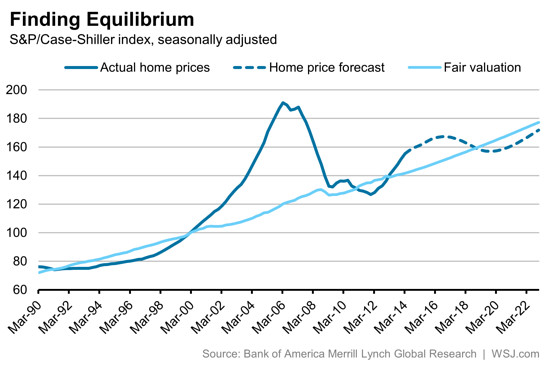
Why You May Rather Own Stocks
1) Higher rate of return. Stocks have historically returned ~7-9% a year compared to 2-4% for real estate over the past 60 years. You can also go on margin to boost your returns, however, I don’t recommend this strategy given your brokerage account will force you to liquidate holdings to come up with cash when things go the other way. Your bank can’t force you to come up with cash or move out so long as you are paying your mortgage.
2) Much more liquid. If you don’t like a stock or need immediate cash, you can easily sell your stock holdings. If you need to cash out of real estate you could potentially take out a home equity line of credit, but it’s costly and takes at least a month.
3) Lower transaction costs. Online transaction costs are under $10 a trade no matter how much you have to buy or sell. The real estate industry is still an oligopoly and fixes commissions at a ridiculously high level of 5-6%. You would think the invention of Zillow would lower transaction costs, but unfortunately they’ve done very little to help lower expenses. They are in cahoots with the National Association of Realtors because they are their source of advertising revenue.
4) Less work. Real estate takes constant managing due to maintenance, conflicts with neighbors, and tenant rotation. Stocks can literally be left alone forever and pay out dividends to investors. Without maintenance you’re able to focus your attention elsewhere such as spending time with family, your business, or traveling the world. You can easily pay a mutual fund manager 0.5% a year to pick stocks for you or hire a financial advisor at 1% a year. Or you can just track and analyze your portfolio yourself due to so many free financial tools online.
5) More variety. Unless you are super rich, you can’t own properties in Honolulu, San Francisco, Rio, Amsterdam and all the other great cities of the world. With stocks you can not only invest in different countries, you can also invest in various sectors. A well diversified stock portfolio could very well be less volatile than a property portfolio.
6) Invest in what you use. One of the most fun aspects about the stock market is that you can invest in what you use. Let’s say you are a huge fan of Apple products, McDonald’s cheeseburgers, and Lululemon yoga pants. You can simply buy AAPL, MCD, and LULU. It’s a great feeling to not only use the products you invest in, but make money off your investments.
7) Tax benefits. Long term capital gains and dividend income are taxed at lower rates (15% and 20%) than the top four W2 income rates (28%, 33%, 35%, 39.6%). If you can build your financial nut large enough so that the majority of your income comes from dividends, you could lower your marginal tax rate by as much as 20% or so, depending on the current legislation.
8) Hedging is easier. You can protect your real estate investments through insurance. If disaster strikes, it’s often a pain to get your insurance company to pay for damages because the burden is on you to prove your claim. With stocks, you can easily short stocks or buy inverse ETFs to protect your portfolio from downside risk.
9) Potentially less ongoing taxes and fees. Holding property requires paying property taxes usually equal to 1-3% of the value of the property each year. Then there’s maintenance costs, insurance costs, and property management costs. You can build your own portfolio of individual stocks and bonds for just $5 a trade. Or you can have a digital wealth advisor like Wealthfront build and maintain your investment portfolio for just 0.25% a year in assets under management after the first $15,000.
Characteristics Most Suitable For RE Or Stocks
Real Estate
* Believe wealth is made up of real assets not paper.
* Know where you want to live for at least five years.
* Do not do well in volatile environments.
* Easily spooked by downturns.
* Tend to buy and sell too often. High transaction costs ironically keep you from trading too often.
* Enjoy interacting with people.
* Takes pride in ownership.
* Likes to feel more in control.
Stocks
* Happy to give up control to those who should know better.
* Can stomach volatility.
* Have tremendous discipline not to chase rallies and sell when things are imploding.
* Likes to trade.
* Enjoy studying economics, politics, and researching stocks.
* Don’t want to be tied down.
* Have a limited amount of capital to invest.
The Key Is To Invest For The Long Term
The choice between investing in real estate or stocks is like choosing between eating a seven layer chocolate cake or a homemade lemon meringue pie. Both are good provided you don’t go overboard and can hold on for the long term. When you are younger, investing in stocks is easier and makes more sense since you have less money and want to be more mobile for job opportunities. As you get older you probably want to set some roots so owning at least your primary residence is beneficial.
With stocks, it’s nice to see portfolio values go up. But after a while, it becomes unsatisfying to see more money accumulate in your brokerage account. Money needs to be spent on something, otherwise, what’s the point of saving and investing? Hence, my bias is towards real estate because you not only get to enjoy the asset, there’s also a good chance you can make a profit over the long run as well.
Own assets that rise with inflation such as stocks and real estate. Even if there’s a 20% correction, 10 years from now you’ll likely be happy you invested today.
Note: There is a poll embedded within this post, please visit the site to participate in this post's poll. Note: There is a poll embedded within this post, please visit the site to participate in this post's poll.Readers, do you own stocks, physical real estate, or both? Do you prefer stocks or real estate as an investment?
from Financial Samurai http://www.financialsamurai.com/what-percentage-of-americans-own-stocks-or-real-estate/

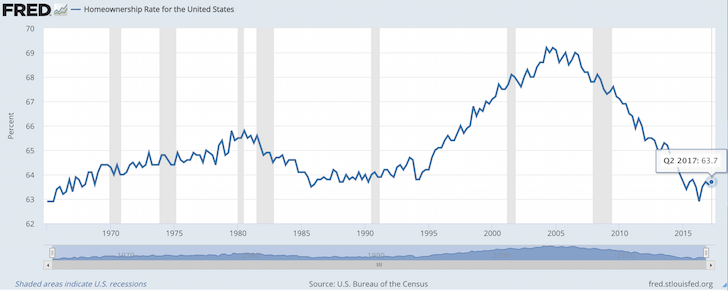

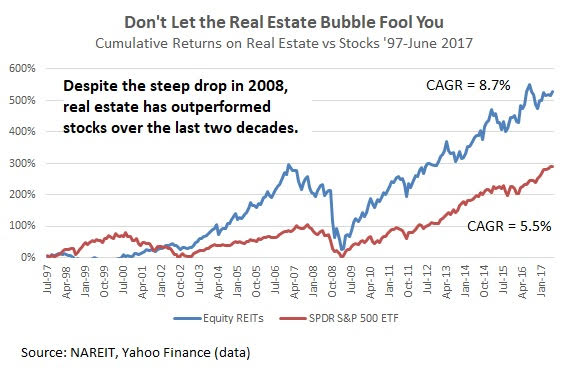
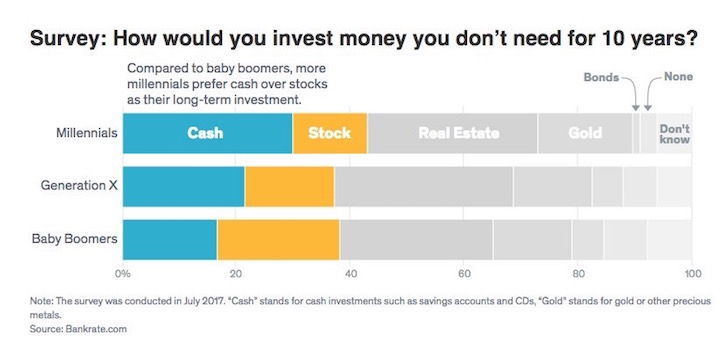
No comments:
Post a Comment